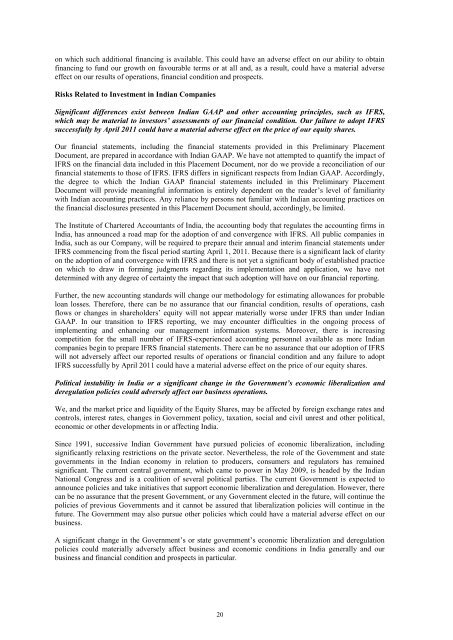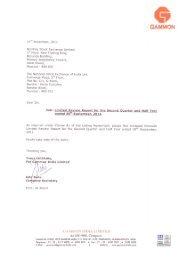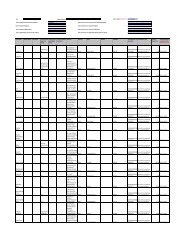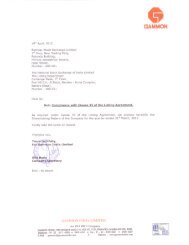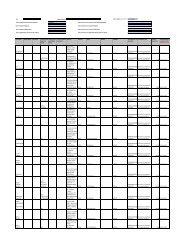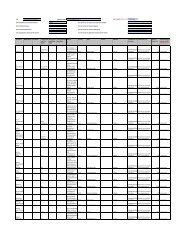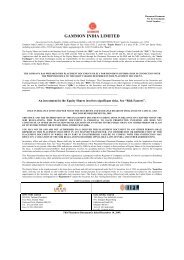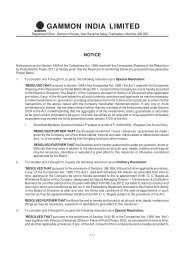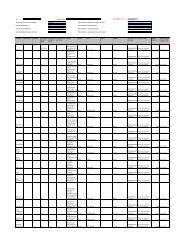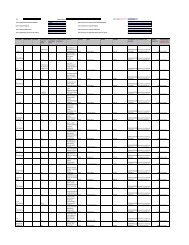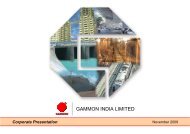GAMMON INDIA LIMITED
GAMMON INDIA LIMITED
GAMMON INDIA LIMITED
You also want an ePaper? Increase the reach of your titles
YUMPU automatically turns print PDFs into web optimized ePapers that Google loves.
on which such additional financing is available. This could have an adverse effect on our ability to obtain<br />
financing to fund our growth on favourable terms or at all and, as a result, could have a material adverse<br />
effect on our results of operations, financial condition and prospects.<br />
Risks Related to Investment in Indian Companies<br />
Significant differences exist between Indian GAAP and other accounting principles, such as IFRS,<br />
which may be material to investors’ assessments of our financial condition. Our failure to adopt IFRS<br />
successfully by April 2011 could have a material adverse effect on the price of our equity shares.<br />
Our financial statements, including the financial statements provided in this Preliminary Placement<br />
Document, are prepared in accordance with Indian GAAP. We have not attempted to quantify the impact of<br />
IFRS on the financial data included in this Placement Document, nor do we provide a reconciliation of our<br />
financial statements to those of IFRS. IFRS differs in significant respects from Indian GAAP. Accordingly,<br />
the degree to which the Indian GAAP financial statements included in this Preliminary Placement<br />
Document will provide meaningful information is entirely dependent on the reader‘s level of familiarity<br />
with Indian accounting practices. Any reliance by persons not familiar with Indian accounting practices on<br />
the financial disclosures presented in this Placement Document should, accordingly, be limited.<br />
The Institute of Chartered Accountants of India, the accounting body that regulates the accounting firms in<br />
India, has announced a road map for the adoption of and convergence with IFRS. All public companies in<br />
India, such as our Company, will be required to prepare their annual and interim financial statements under<br />
IFRS commencing from the fiscal period starting April 1, 2011. Because there is a significant lack of clarity<br />
on the adoption of and convergence with IFRS and there is not yet a significant body of established practice<br />
on which to draw in forming judgments regarding its implementation and application, we have not<br />
determined with any degree of certainty the impact that such adoption will have on our financial reporting.<br />
Further, the new accounting standards will change our methodology for estimating allowances for probable<br />
loan losses. Therefore, there can be no assurance that our financial condition, results of operations, cash<br />
flows or changes in shareholders‘ equity will not appear materially worse under IFRS than under Indian<br />
GAAP. In our transition to IFRS reporting, we may encounter difficulties in the ongoing process of<br />
implementing and enhancing our management information systems. Moreover, there is increasing<br />
competition for the small number of IFRS-experienced accounting personnel available as more Indian<br />
companies begin to prepare IFRS financial statements. There can be no assurance that our adoption of IFRS<br />
will not adversely affect our reported results of operations or financial condition and any failure to adopt<br />
IFRS successfully by April 2011 could have a material adverse effect on the price of our equity shares.<br />
Political instability in India or a significant change in the Government’s economic liberalization and<br />
deregulation policies could adversely affect our business operations.<br />
We, and the market price and liquidity of the Equity Shares, may be affected by foreign exchange rates and<br />
controls, interest rates, changes in Government policy, taxation, social and civil unrest and other political,<br />
economic or other developments in or affecting India.<br />
Since 1991, successive Indian Government have pursued policies of economic liberalization, including<br />
significantly relaxing restrictions on the private sector. Nevertheless, the role of the Government and state<br />
governments in the Indian economy in relation to producers, consumers and regulators has remained<br />
significant. The current central government, which came to power in May 2009, is headed by the Indian<br />
National Congress and is a coalition of several political parties. The current Government is expected to<br />
announce policies and take initiatives that support economic liberalization and deregulation. However, there<br />
can be no assurance that the present Government, or any Government elected in the future, will continue the<br />
policies of previous Governments and it cannot be assured that liberalization policies will continue in the<br />
future. The Government may also pursue other policies which could have a material adverse effect on our<br />
business.<br />
A significant change in the Government‘s or state government‘s economic liberalization and deregulation<br />
policies could materially adversely affect business and economic conditions in India generally and our<br />
business and financial condition and prospects in particular.<br />
20


